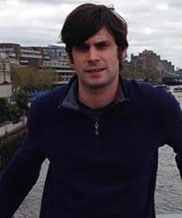AI for Affect, Personalization and Reciprocity: Modeling the Self and the Other
 Nick Haber is an Assistant Professor at the Stanford Graduate School of Education, and by courtesy, Computer Science. After receiving his PhD in mathematics on Partial Differential Equation theory, he worked on Sension, a company that applied computer vision to online education. He then co-founded the Autism Glass Project at Stanford, a research effort that employs wearable technology and computer vision in a tool for children with autism. Aside from such work on learning and therapeutic tools, he and his research group develop artificial intelligence systems meant to mimic and model the ways people learn early in life, exploring their environments through play, social interaction, and curiosity.
Nick Haber is an Assistant Professor at the Stanford Graduate School of Education, and by courtesy, Computer Science. After receiving his PhD in mathematics on Partial Differential Equation theory, he worked on Sension, a company that applied computer vision to online education. He then co-founded the Autism Glass Project at Stanford, a research effort that employs wearable technology and computer vision in a tool for children with autism. Aside from such work on learning and therapeutic tools, he and his research group develop artificial intelligence systems meant to mimic and model the ways people learn early in life, exploring their environments through play, social interaction, and curiosity.
Nick describes his team’s work to prototype and validate a potential therapy for children with autism. The prototype uses Google Glass and computer vision. In designing learning tools that augment learning processes, Nick advocates that we need computationally-precise understanding of the learning processes we are trying to improve. He recommends that we can create more life-like interactive experiences when the artificial intelligence considers people as agents, with their own knowledge, goals, and emotions.
See more talks from the Human Requirements for Immersive Experiences Colloquia:
Immersion for Collaboration, Immersion for Discovery and Immersion for Learning